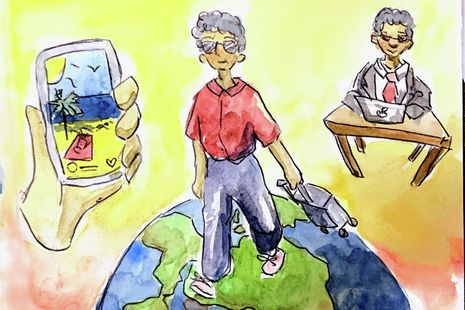How to spend a Cambridge summer
Natalia Pilu speaks to students about the best way to spend your summer break

While many students spend their summer necking pints after a shift or dipping into their overdraft for a week in Benidorm, Cambridge students seem to scatter across the globe. Stories of backpacking across southeast Asia or working eighteen hour days at a prestigious Google internships may lead one to feel inadequate about spending their summer quietly. But is the ideal Cambridge summer really as good as people say it is, and are flashy getaways and prestigious internships really as widespread as they seem?
Fearghus Beauchamp, a second year economics student at Robinson, went to “Italy and Greece initially, before coming home for a festival and then heading back out to Australia and New Zealand.” Short turnovers between flights are definitely an underlying theme: Olivia Wright, a third year natural sciences student at Emmanuel, only spent 3 days at home between the US, Italy, and Bali before returning to Cambridge to row.
Scrolling through Instagram, it is easy to presume Cambridge summers are just shallow flexes of self-improvement. However, talking to students reveals that there is more depth to their travels. Jonathan Corner, 2nd year history at Caius, described teaching 14-18 year olds at schools in Hangzhou, China, as “transformative”.
“Experiencing a totally different environment helped me retrain my own unconscious biases and cultural assumptions”. He describes his most memorable moment as simply having a “conversation with a waitress [about our lives] over dumplings in Beijing,” instead of the various lectures he taught on the Viking age or transatlantic slavery.
“Talking to students reveals that there is more depth to their travels”
Olivia’s 7 weeks in Cambridge, Massachusetts were spent in the Dana Farber Cancer Institute, where she conducted valuable research. She talks about how her lab work will have “definitely helped my career if I decide to do a PhD”. “Harvard on your CV is a good thing regardless.”
It is important to acknowledge that being at Cambridge is the key to opening these doors. What becomes clear is that these opportunities are not just about ambition and networking, but how the university itself is a passport. Jonathan Corner’s programme in Hangzhou was run by CAPY (Cambridge Asia Pacific, a student society). He said that “being a student here helped me entirely,” and that the programme being open only to Cambridge students gave him a “once in a lifetime opportunity”.
Ariunaa Alaszewski-Khargana similarly reaped the benefits of Cambridge. Spending 2 months in Japan “facilitating discussions about sustainable development goals” was facilitated by a programme whose aim was to “bring students from top universities in the UK, US and Canada.” We should value that being a student at Cambridge can directly unlock these roles. “Being at Cambridge was integral,” she said.
Regardless, personal ambition and success still seem to be fundamental. For example, Olivia, having taken the same educational path as John Harvard himself, found the opportunity through Emmanuel College’s partnership with Harvard University. But ultimately, she competed in the rigorous admissions process to warrant her research internship.
“Being a student here helped me entirely”
Despite these incredible opportunities, they often come at a significant cost. Money seems to be the invisible engine powering this brand of global cosmopolitanism. Once again, Cambridge is a driving force here, generously providing travel grants to finance its students’ experiences. Second year AMES student Ariunaa at Trinity received a lavish £2000 grant to fund her time in Japan. Trinity enriches its students with its considerable endowments, topping the tables in money spent in travel grants: one Varsity article from October 2024 found they spent almost £200k over the course of the 2023-2024 academic year.
However, it is not just college money funding these continental circuits. Fearghus paid his way along his world tour through various sources, such as “freelance work as an organist and piano accompanist”. Rather in keeping with an economics student stereotype, he joked, he also invested some of the money he made. Further, he, and certainly many other students, tutored academically for what many consider easy money.

Cambridge caught on camera – should we leave our phones behind?
Nevertheless, some students must work a perhaps less prestigious job in order to fund any of their summer. One student, Jack Stephens, put it bluntly: “I’m out here putting in 50-hour weeks on a construction site in the middle of nowhere just to scrape together enough for my studies – I can’t help but wonder how so many Cambridge students seem to burn through what looks like an entire UK salary on their so-called ‘summer travels.’” This showcases that internships and travelling are not the universal events of a Cambridge summer. The flashier – and perhaps richer – majority may provide a false scope of a true summer experience.
Reuniting in Michaelmas will spark a contest over who has procured the most fantastic Instagram highlights. Cambridge kids seem determined to return from their adventures with either a revamped CV, 20-something place magnets, or both. Everyone else comes back hungover.
 News / Judge Business School advisor resigns over Epstein and Andrew links18 February 2026
News / Judge Business School advisor resigns over Epstein and Andrew links18 February 2026 News / Hundreds of Cambridge academics demand vote on fate of vet course20 February 2026
News / Hundreds of Cambridge academics demand vote on fate of vet course20 February 2026 News / Petition demands University reverse decision on vegan menu20 February 2026
News / Petition demands University reverse decision on vegan menu20 February 2026 News / CUCA members attend Reform rally in London20 February 2026
News / CUCA members attend Reform rally in London20 February 2026 News / Gov grants £36m to Cambridge supercomputer17 February 2026
News / Gov grants £36m to Cambridge supercomputer17 February 2026









